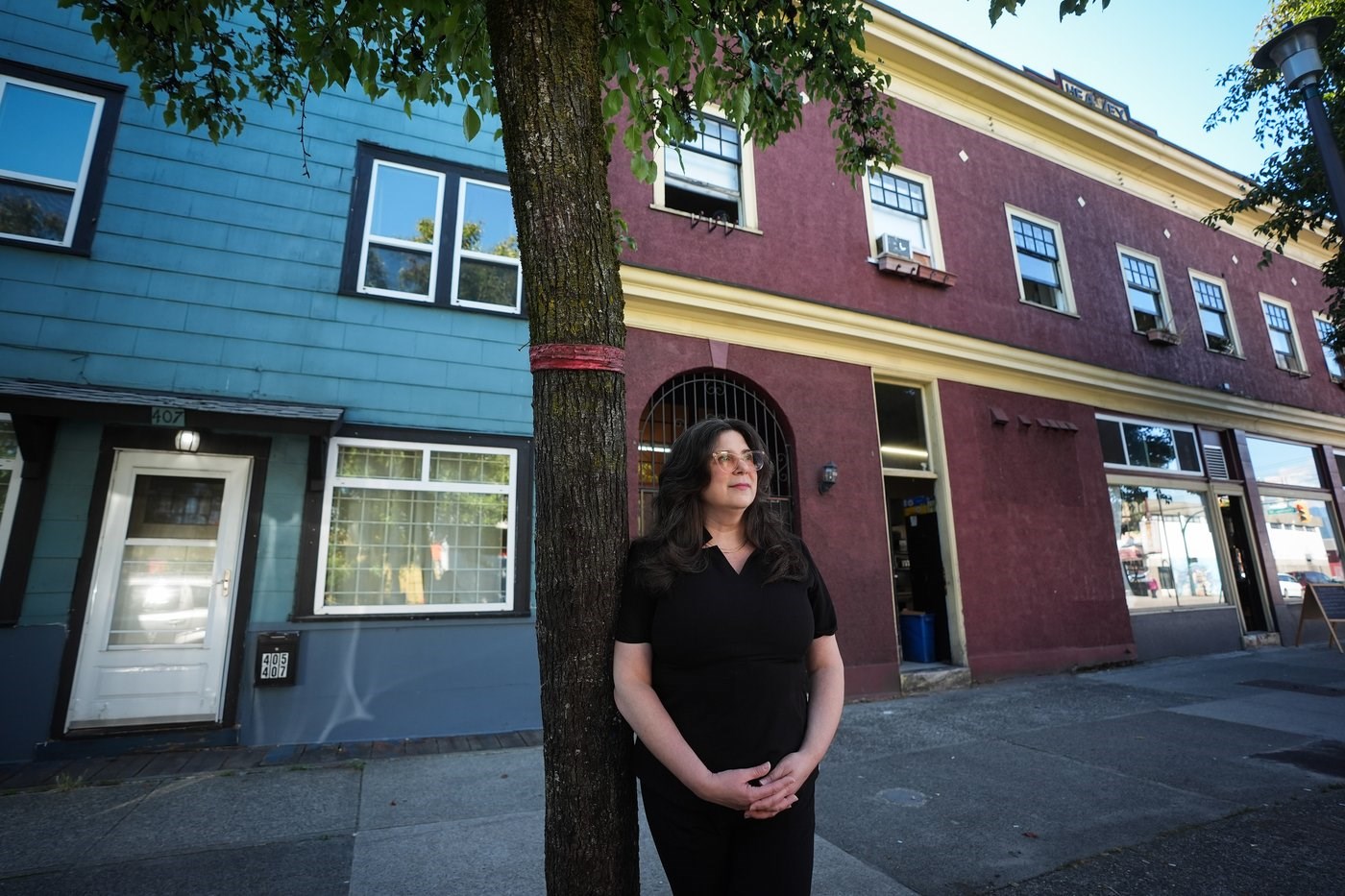
Former community coroner Sonya Schulz poses for a photograph outside The Heatley Block single-room occupancy building, in Vancouver, on Wednesday, Aug. 20, 2025. THE CANADIAN PRESS/Darryl Dyck
Republished August 29, 2025 - 1:43 PM
Original Publication Date August 29, 2025 - 12:41 PM
VANCOUVER — British Columbia's Ministry of Public Safety says it was unaware of the BC Coroners Service continuing a practice of attending certain death scenes remotely instead of in person after 2019.
Ministry spokeswoman Tasha Schollen said in a statement that the ministry's understanding was that in-person scene attendance had been "restored" six years ago, and it was discussing the situation with the service.
Her remarks came after a former coroner told The Canadian Press that two bodies went unnoticed at the Vancouver death scene of a third person in 2022 in part because the coroner attended remotely by phoning a police officer at the single-room occupancy apartment.
Former community coroner Sonya Schulz said the service stopped requiring coroners to physically attend certain scenes to save money several years ago.
The body of "Jimmy" Van Chung Pham was found in a tiny apartment in February 2022, but the bodies of missing Indigenous teenager Noelle O’Soup and a woman named Elma Enan went unnoticed there for months until residents complained of the smell.
Schulz said she and other community coroners discussed the case, believing the bodies would have been discovered sooner had a coroner attended when Pham's body was found.
The ministry said it was a "tragic situation," and the ministry "is in contact with the BC Coroner’s Service about these allegations."
"With respect to resourcing concerns related to community coroners, the BC Coroners Service is continuing to work with the Ministry of Public Safety and Solicitor General to determine the best path forward in addressing compensation for Section 55 Field Coroners," the ministry's statement said.
"This work reflects a shared commitment to supporting those who serve in this essential role.”
Public safety opposition critic Elenore Sturko said she found it "sickening" to learn how the bodies in Pham's apartment were overlooked.
"Myself being a former RCMP officer, the idea that a person would perform an investigation and not go to the scene is really concerning," Sturko said Friday."
The Vancouver police officer who attended the death scene is facing a neglect-of-duty investigation.
Sturko said she was "deeply disturbed" to learn that a cost-cutting measure may have been a factor in missing human remains at a scene.
Sturko said coroners perform challenging and traumatic work, and mental health supports for them and those that perform body removal services is inadequate.
She said that the low number of autopsies conducted in B.C. is also an issue, creating a situation where "we could be missing, you know, murders."
"This is not the kind of service that we should be cutting corners in," she said.
"Most people would have a hard time understanding the types of challenges that coroners and body removal service people actually face in doing the jobs that they're doing and I think that it's well past time that the government review the compensation model."
Field coroners are paid about $32 an hour but do not get paid for being on call.
Sturko said she was "extremely grateful" that Schulz came forward because "it often has taken the bravery of whistleblowers and people with front line information bravely coming forward before the government takes action."
The policy surrounding remote attendance by coroners at death scenes was discussed in a recent ruling in an employment standards complaint.
A delegate of B.C.'s director of employment standards said in the March ruling that when a field coroner isn't available in a region where a death is reported, a coroner from another area "will typically conduct their investigation of the scene remotely."
The complaint was filed by a community coroner named Dawn Giles in 2023, who claimed the lack of compensation for time spent on-call contravened the province's Employment Standards Act.
Giles is a coroner covering northern Vancouver Island, and she was scheduled to be on-call every third week for 168 consecutive hours.
She said she signed on to the job knowing it was an on-call position, but argued it wasn't made "'abundantly clear' what an on-call period would look like."
Giles claimed that despite knowing the job expectations when she joined the service, "this should not mean that (BC Coroners Service) does not stay current to changing minimum labour law requirements and evolving definitions for what is considered work."
The ruling said the coroners service took the "position that it could not afford to maintain the current coverage for field coroners if all on-call time was considered to be work."
The delegate ruled against Giles, finding she wasn't owed wages for unpaid time spent on-call.
This report by The Canadian Press was first published Aug. 29, 2025.
News from © The Canadian Press, 2025